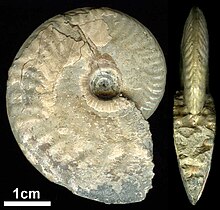Oxycerites
| Oxycerites Temporal range:
| |
|---|---|

| |
| Specimen from Poland | |
| Scientific classification | |
| Kingdom: | Animalia |
| Phylum: | Mollusca |
| Class: | Cephalopoda |
| Subclass: | †Ammonoidea |
| Order: | †Ammonitida |
| Family: | †Oppeliidae |
| Genus: | †Oxycerites |
| Species | |
|
see text | |
Oxycerites is an extinct ammonoid cephalopod belonging to the haploceratoid family, Oppeliidae, that lived during the Middle Jurassic.[1]
Shells of Oxycerites are involute, compressed and generally smooth with a sharply rounded venter on the outer rim, deeply impressed dorsum on the inner rim, and a small umbilicus. The living chamber takes up slightly more than half a whorl. Oxycerites grew to a diameter of at least 17.5 cm, about 7 inches.
Oppelia and Oecotraustes are similar and closely related forms. Oppelia is smoother, Oecotraustes more strongly ribbed
Distribution[]
Jurassic of Argentina, France, Germany, Iran, Madagascar, Russia, Saudi Arabia and the United Kingdom[2]
References[]
- ^ a b Sepkoski, Jack (2002). "A compendium of fossil marine animal genera (Cephalopoda entry)". Bulletins of American Paleontology. 363: 1–560. Archived from the original on 2008-05-07. Retrieved 2017-10-18.
- ^ "Paleobiology Database - Oxycerites". Retrieved 2017-10-20.
Categories:
- Ammonitida genera
- Oppeliidae
- Jurassic ammonites
- Prehistoric animals of Madagascar
- Ammonitina stubs